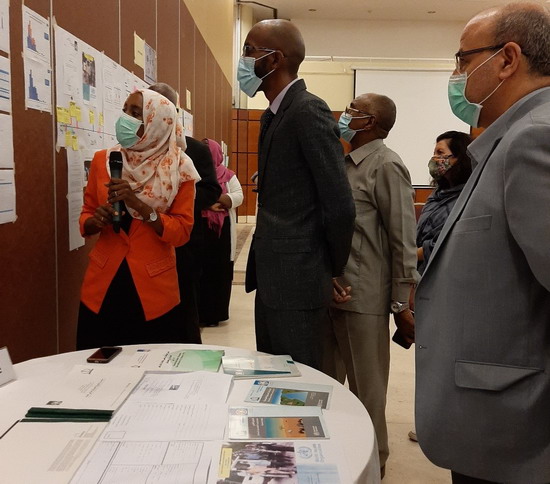 The Acting Federal Minister of Health and WHO Representative listening to one of the pillar groups during the cholera After Action Review
The Acting Federal Minister of Health and WHO Representative listening to one of the pillar groups during the cholera After Action Review
13 October 2020 - Sudan has been experiencing recurrent epidemic-prone disease outbreaks over the last decades such as cholera, chikungunya, malaria, Rift Valley fever and measles, amongst others. These outbreaks are grouped into three major groups: water and sanitation, vector-borne and vaccine-preventable.
Last year Sudan was hit by two major public health outbreaks that are of frequent occurrence in the country: a cholera outbreak between August and December 2019, with a total of 346 associated cases and 11 deaths; and a Rift Valley fever outbreak between September 2019 and January 2020 which affected two states (Red Sea and River Nile) with a total of 571 cases and two deaths.
Ending these outbreaks and preventing their spread inside the country and at the cross-border level is the highest priority for WHO. The Federal and State Ministries of Health, WHO, UNICEF, and national and international partners joined hands to contain the outbreaks through a well-coordinated multisectoral response.
Usually, after responding to a public health outbreak, an After Action Review (AAR) takes place as a component of the International Health Regulations (IHR 2005) requirements to assess the results of interventions against planned outputs. The aim is to improve a country’s capacity to review its response efforts and extract best practices, identify gaps and areas to be improved and identify lessons learned to be better prepared to face future potential public health emergencies.
In other words, the AAR seeks to identify what worked well, what did not and how these practices can be maintained, improved, institutionalized and shared with relevant stakeholders.
Within this context, WHO and the Federal Ministry of Health organized two After Action Reviews, one regarding Rift Valley fever outbreak and the other regarding the cholera outbreak. The meetings gathered colleagues from the Federal and State Ministries of Health, health partners, stakeholders and donors, all of whom were closely involved in the response. The aim was to extract recommendations and concrete outputs through interactive sessions with working groups corresponding to each pillar of the response, final group presentations and discussions.
Due to the difficult and complex context in Sudan, outbreaks are of a recurrent nature, and so AARs are crucial for developing lessons learned so as to be better prepared for the next response. These activities are more vital than ever as Sudan faces one of its worst floods caused by heavy rains and affecting all 18 states of the country. As a result, the Government of Sudan declared a state of emergency on the 4 September and is leading a multisectoral response. Based on the ongoing floods and other confounding factors, WHO has upgraded Sudan’s emergency level to the Grade 2 acute emergency level. This means that there is a great need for a major response effort which requires the initiation of prompt public health measures to provide lifesaving and essential health services and prevent and control epidemic-prone disease outbreaks.








